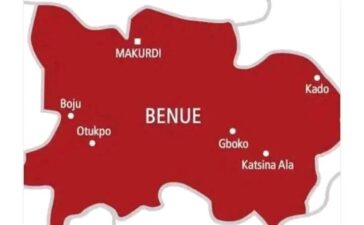Join our WhatsApp channel HERE for the latest Benue news and updates!
Controversy erupted in Makurdi this afternoon as heavy machinery demolished sections of the perimeter fence surrounding the Benue Investment and Property Company (BIPC) headquarters in Nyuma T. Ephraim layout, clearing space for the federal government’s dualization of the Makurdi-Enugu federal highway. Photos circulating on social media show twisted metal poles, shattered concrete blocks, and uprooted electricity transmission towers lying amid the debris, with the iconic BIPC building visible in the background under a partly cloudy sky.
The demolition, confirmed by eyewitnesses around 11 AM, has ignited fierce online discussions, with prominent Tiv activist Ahoho Terungwa posting the images and captioning them: “Nyuma T. Ephraim BIPC fence has been demolished to pave way for the ongoing dualization of Makurdi-Enugu road by the federal government. What do you have to say about this?” The post, which has garnered over 260 reactions and 21 comments within hours, reflects a mix of resignation, anger, and calls for transparency.
The Makurdi-Enugu road dualization project, awarded in phases since 2021, aims to ease chronic traffic bottlenecks and boost commerce between Benue and Enugu states. However, the sudden razing of the BIPC fence—without prior public notice, according to local sources—has raised questions about compensation, safety, and the fate of state-owned assets. The BIPC complex, a key revenue generator for the state through property management and investments, now sits partially exposed, with live power lines dangling precariously near the construction zone.
Residents near the site report that workers from the contracting firm arrived with bulldozers and security escorts, cordoning off the area before beginning the teardown. “We heard the noise and came out to see the fence coming down,” said a trader at the nearby Aliade Market. “No one told us anything. What if those poles fall on someone?” Electricity supply in the neighborhood flickered briefly during the operation, adding to the unease.
The Benue State Government has remained silent on the matter so far, but sources within the Ministry of Works suggest that negotiations over right-of-way encroachments have been ongoing for months. Critics, however, argue that the state’s flagship investment company deserves better protection, especially amid economic hardships. “BIPC is our pride,” one commenter wrote. “If federal projects can just swallow it like this, what hope do we have?”
On the flip side, supporters of the road project point to its long-term benefits. The dualized highway is expected to reduce travel time, curb accidents, and open up new business corridors. “Progress demands sacrifice,” another user replied. “A modern road will bring more investors than a fence ever could.”
As dust settles over the rubble this evening, the incident underscores the delicate balance between federal infrastructure ambitions and state autonomy in Nigeria’s complex governance landscape. With the harmattan haze beginning to thicken and construction noise echoing into the night, Makurdi residents are left wondering: Will the gains of a wider road outweigh the scars left on their city’s landmarks? For now, the fallen fence stands as both a casualty and a symbol of change barreling forward, whether invited or not.


















